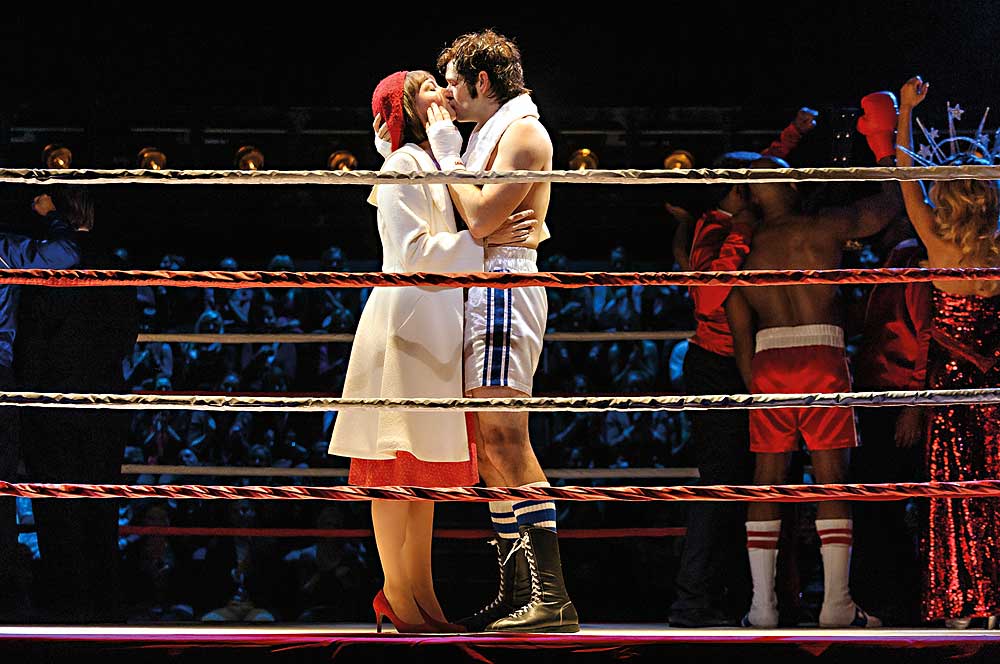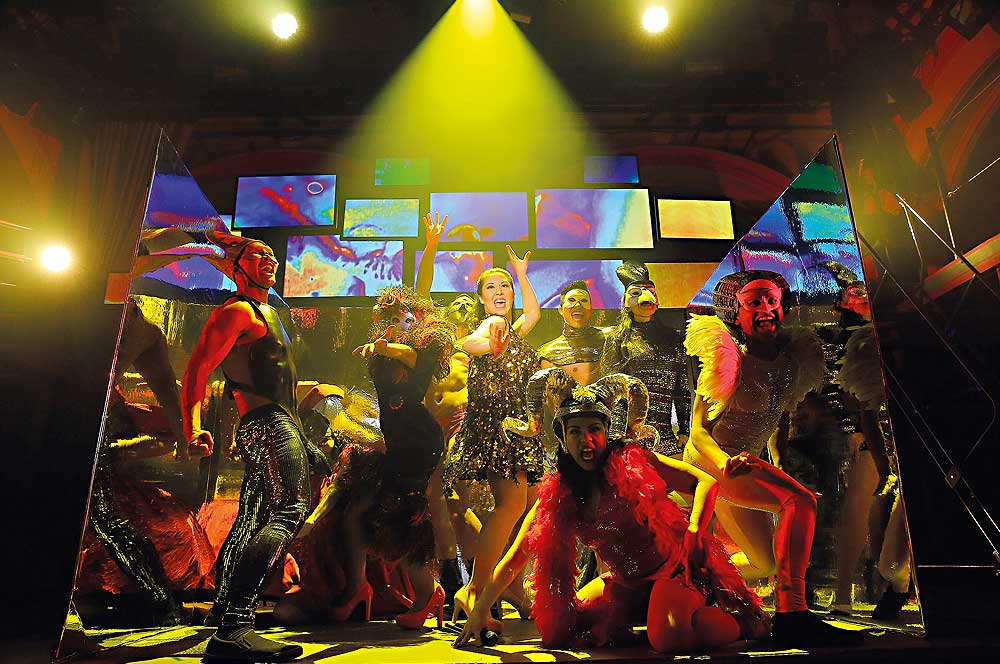Alex Timbers is a veritable theatre rock star. It’s not just his wavy locks, his cadre of fangirls or his recent lineup of hits—Bloody Bloody Andrew Jackson, The Pee-wee Herman Show, Peter and the Starcatcher, Here Lies Love—that makes him worthy of attention. What’s more impressive is that the 35-year-old director, and sometimes writer, works consistently out of the box, bringing an iconoclastic downtown sensibility to his more mainstream work. His latest—and most overtly commercial—project, is a musical adaptation of Sylvester Stallone’s iconic prizefighting film Rocky, which opened on Broadway in March after becoming a hit in Germany. Though adapted by the heavyweight team of Thomas Meehan, Lynn Ahrens and Stephen Flaherty (with Sylvester Stallone sharing book and producing credit), it is Timbers’s theatrical concept that puts the show over. His staging is dominated by a flying boxing ring that floats like a butterfly, swoops down to serve as a ceiling for interior locations, inverts in mid-air to become a projectable surface, and finally sails out into the audience for the climactic championship bout, even spinning to allow the audience to experience the perspective of both boxers from their respective corners. This unusual mix of intimate storytelling and invigorating, immersive spectacle is just the latest instance of Timbers pushing the American musical in new directions.
The possessor of a shaggy, almost Byronic handsomeness, Timbers is unfailingly polite and appealingly self-effacing. If his mind occasionally outraces his speech, his intelligence and thoughtfulness are immediately apparent. He grew up in Manhattan being taken to the occasional Broadway musical by his parents, but headed off to Yale University intent on becoming a filmmaker. There he discovered standup comedy, which soon led him into directing farces, such as Peter Shaffer’s Black Comedy and Ken Ludwig’s Lend Me a Tenor. His avant-garde instincts started to emerge in a self-described “wild” production of How to Succeed in Business Without Really Trying, in which all the secretaries were pregnant and Rosemary sang “Happy to Keep His Dinner Warm” while plunging a toilet. After graduation, his first job was as intern to artistic director Lynne Meadow at Manhattan Theatre Club, which taught him a lot but made him realize that he would not be directing at the MTC level any time soon and needed to create his own opportunities.
In short order the downtown company Les Freres Corbusier was born, debuting with a wordless dance piece called Un Piece de Mouvement Historique Avec la Geometrie that Timbers says involved “gestural choreography to Steve Reich and Philip Glass music, telling the history of math embodied with the creation of the universe.” The intention was to simultaneously satirize and celebrate the avant-garde. Other shows followed that combined his interest in history with high-concept mash-ups of content and style. When New York Times critic Ben Brantley stumbled upon the company’s A Very Merry Unauthorized Children’s Scientology Pageant, his rave review put the young artist on the map. A string of Off-Off-Broadway successes followed while Timbers also got his first taste of Broadway as assistant director to Des McAnuff on Jersey Boys.
Composer/lyricist Michael Friedman—who Timbers has called “a Kurt Weill for our times,” and who wrote the songs to Timbers’s books for Bloody Bloody Andrew Jackson and last summer’s Shakespeare in the Park musical adaptation of Love’s Labour’s Lost—compares Timbers to producer/director Harold Prince. “He’s an impresario,” explains Friedman of the common thread between the two figures. “He doesn’t just see how to direct a show; he also sees how that show will—I don’t want to say ‘sell’—how that show will be. Where it needs to be performed, how the audience should see it, how the advertising should be—all that stuff.”
 Rocky lyricist Lynn Ahrens says that Timbers “imposes a coherent vision on the piece, as opposed to interpreting something inherent.” Her songwriting partner, composer Stephen Flaherty, concurs, but points out, “The staging comes organically out of the work with the actors. There are a lot of directors who are interested in the large picture but never really do focused work with the actors. He’s really different. He’s directing Rocky like he’s directing a play.”
Rocky lyricist Lynn Ahrens says that Timbers “imposes a coherent vision on the piece, as opposed to interpreting something inherent.” Her songwriting partner, composer Stephen Flaherty, concurs, but points out, “The staging comes organically out of the work with the actors. There are a lot of directors who are interested in the large picture but never really do focused work with the actors. He’s really different. He’s directing Rocky like he’s directing a play.”
Timbers’s work is also notable for his quest to use pop music in theatrical ways. According to Barry Edelstein, artistic director of the Old Globe in San Diego, Calif., where Timbers recently helmed The Last Goodbye, Michael Kimmel’s musical version of Romeo and Juliet with Jeff Buckley songs as its score, Timbers “knows his musical theatre, so he understands all the rules about what a musical theatre song is supposed to do.” Songs in a musical need to move the narrative forward, while most pop songs simply state one idea and repeat it. But, says Edelstein, “by cutting and chopping” the tunes and “figuring out some little staging detail, Alex transformed the Buckley songs into musical theatre songs.”
Public Theater artistic director Oscar Eustis calls Timbers “a child of the avant-garde who is completely comfortable celebrating pop culture. He doesn’t make the distinctions between high and low culture that were crucial to my generation of 1970s avant-gardists. Those distinctions were hard and fast; Alex has always been much more playful and fluid about it.” That fluidity is on display in David Byrne’s Here Lies Love, just returned to the Public for an open-ended commercial run after its debut there last year. To tell the story of Ferdinand and Imelda Marcos’s rape of the Philippines, Timbers sets the musical in a disco, complete with 360-degrees worth of video, an exuberant DJ and an audience that’s always on its feet, herded from place to place by movable stage platforms—and occasionally, willing or not, transformed into an adoring crowd for the venal politicians. Call it dancing dialectics.
American Theatre sat down with Timbers while Rocky was in rehearsal to discuss his influences, how he goes about making his art and where he wants to take the American theatre.
ERIK HAAGENSEN: What made you decide to pursue a career making theatre?
ALEX TIMBERS: There were a couple of things that were important. I remember in high school seeing Des McAnuff’s production of Tommy and being blown away by the viscerality of it, the emotionality of it, those visuals, the way it felt like musical theatre and Broadway were having a dialogue with popular culture. It moved at a pace which felt very contemporary. And then in college I learned about Sondheim. Tommy and Sondheim felt visceral and exciting and complicated and dark and really interesting. I also remember the moment when I saw the Matthew Broderick How to Succeed the year after Tommy and being like, “Wow. One guy directed both of those.” I thought that was a very cool thing. Those were hugely influential moments for me.
You started your own theatre company, Les Freres Corbusier. There are so many Off- and Off-Off-Broadway theatre companies in New York, how did you get people to notice your work?
You want to be able to have a clear, easy pitch of what the thing is: Hedda Gabler with robots [Heddatron]. An immersive Christian haunted house [Hell House]. I tried to pick subject matter where you felt you knew a little about it, but basically like two sentences. Not a lot of people know about Andrew Jackson or Robert Moses beyond a couple of facts. The Schoolhouse Rock approach of taking didactic subject matter and making it really fun was the real pleasure, so that people would say, “I saw Boozy [about Moses’s autocratic urban policy], and now I’m in the middle of The Powerbroker, and it’s even better than your play.” That was the ultimate compliment.
You’ve worked in lots of different-sized venues. Do you hope to continue that in the future?
To me that’s the dream. I’ve always admired people like Steven Soderbergh, who’ll make something very small and something very big and be equally pleased by both. What I love is being able to do Rocky and Here Lies Love in the same month. And they’re not two completely different ideas: The final 20 minutes of Rocky has a lot more to do with Here Lies Love than it does with a traditional musical staging, and Here Lies Love is surprisingly emotional in a way one wouldn’t think of as immersive theatre. I love the idea of being able to work in different scales, and I do assume that I will also be working in 99-seat theatres. I’m always trying to figure out what the best theatrical form of a story is.
What are the differences between directing your own work and somebody else’s?
I love the shows that I direct, but when you help create something from scratch, it’s a much more personal relationship you have with it. Being a writer has been really helpful, because I think it makes me a lot more sensitive and attuned to the ways to collaborate effectively, and I think it also has taught me a lot about dramatic structure and things like that, which every director should know. I’ve never truly considered myself a writer; I would consider myself a director who also writes, because I see someone like Lynn Ahrens or Michael Friedman and I’m like, “Wow, those guys are writers.” I have some facility with a very specific voice, and that voice doesn’t work for a lot of things.
I feel very lucky to have come from a downtown experimental theatre world, where people like the Wooster Group either don’t credit writing or call it “text.” Which isn’t to say that the writing isn’t the most important part of any theatre experience; it’s to say that it made me very not precious about my own work.


